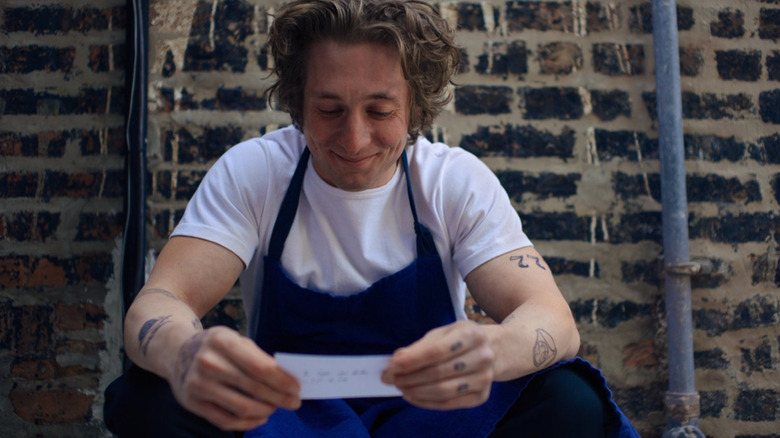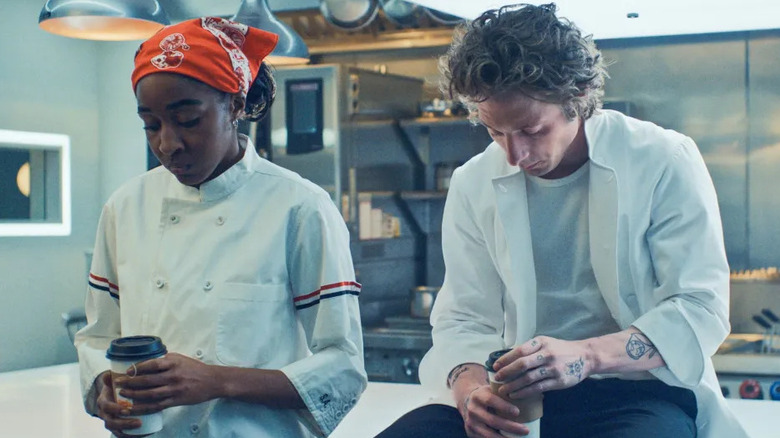The Bear Is Painfully Close To Perfect On Rotten Tomatoes
The transformation of a mom-and-pop beef sandwich shop into a ritzy fine-dining restaurant by way of Carmy Berzatto, a young and talented but emotionally unstable chef, makes for one of the best new television shows — and possibly one of the best ever. The aggregated Rotten Tomatoes score of all three seasons of "The Bear" sits at 97%, with its consensus describing the series as a "perfect mélange of ingredients." (You gotta have food puns in your review!) This score is quite high, even higher than the masterpieces "Breaking Bad," which has a collective Rotten Tomatoes score of 96%, and "Mad Men" at 94%.
"The Bear" doesn't look like any other show on television right now. Creator and co-showrunner Christopher Storer often takes formal risks, like designing season 1, episode 7, "Review," to look like a single shot. The camera bobs on the shoulders of the frazzled chefs as they yell and drop dishes while struggling to keep up with the influx of orders. These kinetic visuals immerse the audience into the chaotic kitchen environment, a place where there's never a moment to catch your breath. We also frequently get inside character's heads — specifically, Carmy's anxiety dreams, where pots are on fire and the ticket machine prints a never-ending stream of orders. Season 1 has a perfect Rotten Tomatoes score of 100%, while season 2 is almost there with 99%, "another supremely satisfying dish."
Season 2's "Fishes" is one of the best episodes of television, period. The unrelenting close-ups and overlapping dialogue draws us into the overwhelming presence of Carmy's home life. His mother is an emotional rollercoaster of depression and egotism while she frantically prepares Christmas dinner and the rest of the family argues in the dining room. All of this builds to a jaw-dropping ending. But will "The Bear" seasons continue to get near-perfect RT scores?
The Bear season 3 takes a dip
Season 3 sits (a little) lower than the rest of the seasons at 93%. Rotten Tomatoes' consensus on the season as "simmering" and "stewing" is fitting; the season relishes in the psychological lives of its characters, preferring a more pensive pacing than the jittery one the series became famous for. The first episode is a montage with little dialogue set to "Together" by Nine Inch Nails. It weaves back and forth through Carmy's culinary tutelage after he left home. We see him truly thriving and savoring the fruits of his labor. On the one hand, it is artistically daring to premiere a season in this way; on the other, it feels a bit indulgent, especially given how short the season is. While we gain more insight into Carmy's past, devoting the entire episode to it seems a bit excessive. We want to see how The Bear is moving forward.
There's very little conflict in season 3 as we mostly wallow in Carmy's distressing quest for greatness. The overarching questions of the season and series thus far — How can searching for unattainable perfection destroy the enjoyment of your craft? What is the line between dedication and having your passion consume your life? — have been pretty clear, but season 3 keeps beating it over your head. The intimate gaze that provided so much introspection during the last two seasons ends up feeling a bit overdone here. How many close-ups of an emotionally distraught Carmy can we handle? Season 4, which was not filmed back-to-back with season 3 as originally planned, will make or break whether or not the Rotten Tomatoes score will rise or continue to fall. Perhaps these seasons are meant to complement each other: the third season builds everything up, while in the next season everything comes crashing down.

